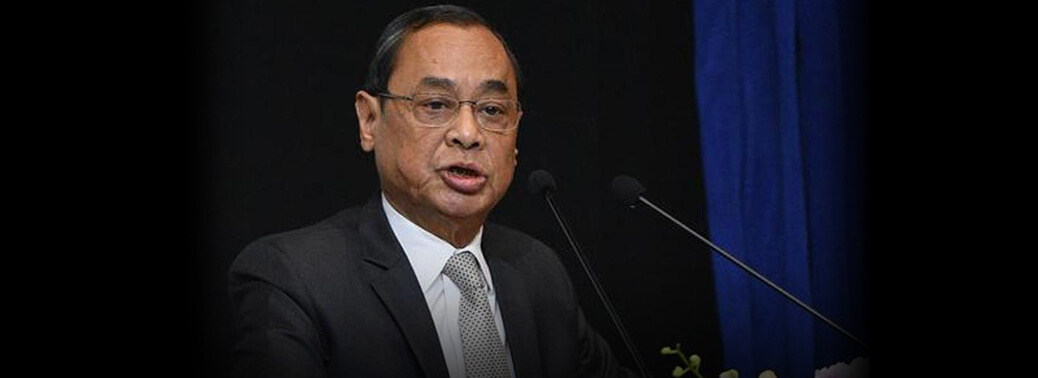IN HIS OWN CAUSE: ON COMPLAINT AGAINST CJI RANJAN GOGOI
22, Apr 2019

Prelims level : Rights Issues
Mains level : Welfare schemes for protection of vulnerable sections
Why in News:
- Chief Justice of India has been victimised for sexual harassment by former Supreme court employee
Details:
- An issue within the domain of an internal process was taken up by a special Bench constituted by CJI Ranjan Gogoi, comprising himself, Justice Arun Mishra and Justice Sanjiv Khanna.
- A mention by the Solicitor-General, was listed as ‘Re: Matter of Great Public Importance
- Touching upon the Independence of the Judiciary’.
- The Supreme Court itself has an internal sub-committee under its Gender Sensitization and Sexual Harassment of Women at Supreme Court (Prevention, Prohibition and Redressal) Guidelines, 2015.
- The complainant by a former junior court assistant, made her charge in the form of an affidavit, supported by purported evidence, and sent it to 22 judges of the court.
- It referred to likely witnesses to the alleged sexual harassment and victimisation.
Issues:
- The decision to hold an open court hearing is questionable. A complaint of this nature requires an institutional response on the administrative side.
- There should be an internal process to initiate an inquiry mandated by the law regarding sexual harassment at the workplace. There is a separate ‘in-house procedure’ to deal with complaints against judges, under which their judicial peers, and not outsiders, will examine them. CJI ought not to have presided over the special Bench that took up the matter that concerned himself. Senior-most judges were kept out of Benches handling major cases, where CJI went on to form a Bench that included himself but not the two senior-most judges after him. Nor was there a woman judge on the Bench.
Sexual Harassment Law
- The Sexual Harassment of Women at Workplace (Prevention, Prohibition and Redressal) Act, 2013 is a legislative act in India that seeks to protect women from sexual harassment at their place of work. It was passed by the Lok Sabha (the lower house of the Indian Parliament) on 3 September 2012.
- It was passed by the Rajya Sabha (the upper house of the Indian Parliament) on 26 February 2013. The Bill got the assent of the President on 23 April 2013.
- The Act came into force from 9 December 2013. Under the Act, which also covers students in schools and colleges as well as patients in hospitals, employers and local authorities will have to set up grievance committees to investigate all complaints. Employers who fail to comply will be punished with a fine of up to 50,000 rupees.
The key provisions of the present Act
- Sexual Harassment of Women at Workplace (Prevention, Prohibition and Redressal) Act was passed in 2013.
- It broadens the Vishaka guidelines, which were already in place.
- Definition – An aggrieved victim is a woman “of any age whether employed or not”, who “alleges to have been subjected to any act of sexual harassment”.
- The Act thus covers the rights of all women working or visiting any workplace, in any capacity.
- Sexual harassment is any one or more of “unwelcome acts or behaviour”, committed directly or by implication.
They include:
- Physical contact & advances
- A demand or request for sexual favours Sexually coloured remarks
- Showing pornography
- Any other unwelcome physical, verbal or non-verbal conduct of sexual nature Additionally, the Act mentions five circumstances that amount to sexual harassment: implied or explicit promise of preferential treatment in her employment
- implied or explicit threat of detrimental treatment
- implied or explicit threat about her present or future employment status interference with her work or creating an offensive or hostile work environment humiliating treatment likely to affect her health or safety
Highlights:
- The bench was acting on online media reports of sexual harassment complaint made by a former junior assistant of the CJI, against him.
- The CJI had received a communication from four leading websites saying that a letter is
- being circulated by a dismissed SC employee alleging that CJI has sought sexual favours from her. The letter stated that the woman’s family had been threatened, harassed and criminal cases were filed against them. The bench took the special hearing on April 20 after it was mentioned by Solicitor General of India, Tushar Mehta.
Vishaka Guidelines:
- The Vishaka guidelines were laid down by the Supreme Court in Vishakha and others v State of Rajasthan judgment in 1997. It imposes three key obligations on employing institutions prohibition, prevention, and redress. The institutions are mandated to establish a Complaints Committee. This was to look into matters of sexual harassment of women at the workplace. These guidelines are legally binding.
Way Forward:
- This is a serious matter that requires careful processing.
- It is possible even now to send the complaint to an independent committee.
- Only reasonable and fair means of establishing the innocence the CJI has to be asserted.






